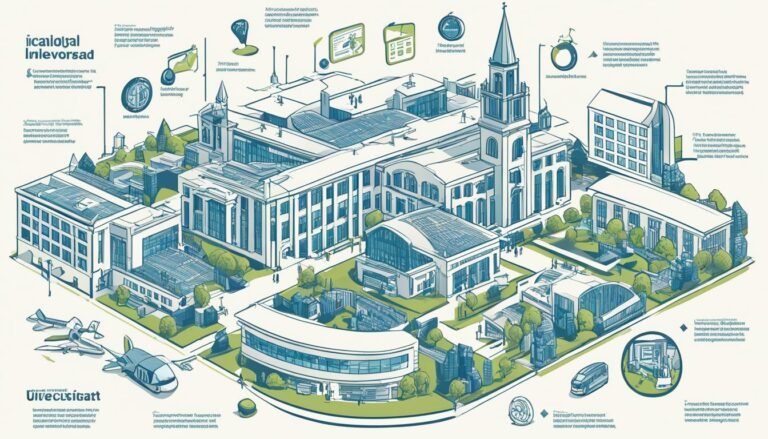Career-Focused Programs: What Ireland’s Colleges Offer
Ever thought about how a career-focused education can help you in today’s job market? Ireland’s schools are now focusing more on programs that prepare you for the workforce. Colleges like Dublin Business School, Griffith College, and Trinity College lead the way with their career-focused courses.
These colleges welcome students from all over the world. They’re not just places to learn; they’re your ticket to success in fields like business, tech, and the arts.
Dublin Business School has over 9,000 students from different countries. Griffith College has more than 7,000 students in various programs. Maynooth University has around 15,000 students from over 100 countries.
These numbers show the diverse and rich learning environment in Irish colleges. They’re dedicated to giving students industry-ready degrees and hands-on experience. This prepares them for the job world.
Key Takeaways
- Irish colleges offer a range of career-focused programs emphasizing vocational education.
- Institutions like Dublin Business School and Trinity College attract a diverse student population.
- Industry-aligned degrees enhance employability and practical skills.
- Ireland is known for its rigorous academic standards and globally recognized degrees.
- Generous post-study work visa options support students’ career paths post-graduation.
Introduction to Career-Focused Education in Ireland
Career-focused education in Ireland is key for students, especially international students, who want practical skills and knowledge. Griffith College Dublin serves over 7,000 students with programs that match job market needs. They offer everything from certificates to master’s degrees, with over 200 accredited programs.
Ireland’s colleges focus on making students job-ready. At Griffith College, over 63% of students do work placements, leading to jobs at top companies like PwC and Google. These experiences are vital for international students as they learn to handle the global job market.
Ireland’s colleges create a supportive environment for students. They offer great support and small class sizes. Plus, they work with over 200 international universities, giving students a global perspective. This approach prepares students for a tough job market, helping them succeed at home and abroad.
The Importance of Vocational Education
Understanding the value of vocational education is key for students looking at their career options. This type of education focuses on practical skills and technical training that match the job market. Schools in Ireland are changing to offer knowledge that fits industry needs, helping students get ready for their careers and making them more employable.
Understanding Vocational Education
Vocational education teaches the practical skills needed for different jobs. It includes hands-on classes, internships, and real-world experiences. In Ireland, groups like Education and Training Boards (ETBs) offer training that meets industry needs. With more apprenticeships, students get a mix of practical and theoretical knowledge.
Benefits of Choosing Vocational Programs
Vocational programs have many benefits, especially for getting a job and moving up in your career. They often lead to better job placement rates because they match what employers want. Many courses are made to fit current job market trends, giving students skills that are wanted and useful. By choosing vocational education, you can:
- Get better employability with training specific to your industry.
- Find more traineeship and apprenticeship chances.
- Feel more confident in your skills, making it easier to start your career.
Overview of Skill-Based Curricula in Irish Colleges
Irish colleges now focus on skill-based curricula that match education with what the industry needs. These programs combine practical learning with theory. This way, students get both the skills and knowledge needed to succeed in the job market.
What Skill-Based Curricula Entail
Skill-based curricula in Irish colleges offer a structured learning path focused on real-world applications. They include:
- Case studies that reflect practical problems.
- Practical projects that promote creativity and innovation.
- Internships that offer direct exposure to industry environments.
Undergraduate and postgraduate programs focus on skill development. This ensures students are ready for work right after graduation.
Examples of Skill-Based Courses Offered
Irish colleges offer many skill-based courses for different interests and career paths. Some examples are:
- MSc in Cybersecurity, focusing on the growing demand for cybersecurity professionals.
- BA in Fashion Design, which merges creativity with industry trends.
- Engineering diplomas at Technological University Dublin, aimed at meeting the need for skilled engineers.
These courses address labor shortages in various sectors. They prepare graduates with the skills employers look for. The focus on practical learning equips students to face today’s challenges, making them valuable in their fields.
Industry-Aligned Degrees: Bridging Education and Employment
Industry-aligned degrees are key to making sure education meets employer needs and gives students the right skills. They are made with help from industry pros, shaping the curriculum design to match what the market wants. Schools like Queen’s University Belfast and Trinity College Dublin show how partnerships can make learning better.
What Are Industry-Aligned Degrees?
These degrees focus on giving students the exact skills needed for certain jobs. They close the skills gap in many fields by updating the curriculum design. This keeps the content fresh, reflecting new tech and what employers expect, so students are ready for the job world.
Benefits for Students and Employers
Industry-aligned degrees help both students and employers. For students, they make getting a job easier by giving them the right skills. Many graduates get jobs quickly after they finish. Employers gain too, getting workers with the exact skills they need to boost productivity and innovation.
Job-Readiness Training and Its Impact
Job-readiness training helps students get ready for the job market. It covers important skills needed for a career. Colleges in Ireland focus on these programs to make sure graduates are ready for work.
Components of Job-Readiness Training
A good job-readiness program has many parts to improve student skills. These include:
- Soft skills development, which focuses on communication and teamwork
- Resume writing techniques to stand out
- Interview preparation, covering common questions and practices
- Networking strategies for professional relationships
Places like University College Dublin and the University of Limerick offer workshops. These cover these areas, giving students a broad skill set for the workplace.
How to Identify Effective Programs
When picking job-readiness programs, look at a few key things. Consider:
- Curriculum relevance, making sure it matches industry standards
- Instructor experience, showing the program’s trustworthiness
- Internship or work placement chances for real-world experience
Colleges with strong ties to industry and good alumni networks offer great insights and resources. This helps students face real-world challenges and find successful careers.
Experiential Learning Opportunities in Irish Colleges
Experiential learning links classroom knowledge with real-world situations. It gives students hands-on experience in practical scenarios. This approach includes internships, cooperative education, service-learning, and project-based assignments.
Definition and Types of Experiential Learning
Experiential learning says students learn best by doing. By working on real projects, they gain valuable skills and knowledge. Irish colleges offer these programs, making sure students apply what they’ve learned in real situations.
Notable Institutions Providing Such Opportunities
Many Irish colleges are known for their focus on experiential learning. Here are a few:
- Trinity College Dublin, which uses small-group work and seminars for active student participation.
- Dublin Business School, famous for its many internship chances with local companies.
- Griffith College, which works with different organizations to give students industry experience.
These colleges aim to boost students’ resumes with hands-on learning. This approach helps students grow personally and prepares them for their careers.
Workforce Development Initiatives at Irish Institutions
Irish schools are now focusing more on helping students get ready for the job market. They offer programs and trends that help with career growth. These efforts meet the changing needs of employers.
Current Workforce Development Trends
Now, there’s a big push for educational initiatives that fit the needs of the job world. The MicroCreds.ie platform started on July 12, 2023, with a big boost from the Higher Education Authority. It’s a €12.3 million project that gives over 300 short courses by seven universities. These courses aim to fill skills gaps in the workforce.
This shows Ireland’s aim to have 60% of adults upskill by 2030. It shows a big push for ongoing learning in the country.
Case Studies of Successful Programs
Dublin City University is a great example of a successful program. It focuses on entrepreneurship. Students there have started their own businesses with help from the university. This hands-on learning makes graduates more job-ready and adds to their book smarts.
These stories show how targeted educational efforts can really pay off. They help both students and the job market grow.
Professional Certification Programs Available in Ireland
In Ireland, professional certification programs are key for improving skills and moving up in your career. Places like UCD Professional Academy and Pitman Training offer programs that are recognized and approved. These courses give you the skills you need to do well in your job and make sure you’re recognized in your field.
Types of Professional Certifications
There are many types of professional certifications for different fields. Some of the main ones include:
- Project Management Professional (PMP)
- Six Sigma Certification
- Microsoft and CompTIA Certifications
- Adobe Certifications
- Professional Academy Diplomas from UCD
These programs are short, usually lasting about 36 hours. This means you can quickly get new skills and use them right away at work. Plus, they offer flexible learning schedules that work with your job.
Reputation and Recognition of Certification Programs
Certification programs in Ireland are well-known and respected. For example, Pitman Training’s courses are recognized across the country and even internationally. This shows their worth in the job market. Graduates often see real career benefits, like more job opportunities and higher pay.
About 40% of students getting a Professional Academy Diploma have their company pay for it. This shows how much employers value these certifications. In Ireland, getting professional certifications is a strong way to boost your career and stand out in a crowded job market.
Career-Oriented Academics: A Key Focus of Irish Colleges
Irish colleges put a big focus on career-oriented academics. They blend career-focused learning into their courses. This helps students get the skills they need for a job.
This approach makes learning more meaningful and prepares students for their careers. It’s a strong start for a successful career.
How Colleges Integrate Career-Focused Learning
Irish colleges use different ways to teach career skills. These include:
- Workshops that teach important skills
- Hands-on projects for real-world experience
- Networking with industry experts
This ensures students learn by doing and making connections. These are key for getting a job.
Benefits for Students Pursuing Career-Oriented Academics
Students in career-focused programs get big benefits:
- Targeted skill development that meets job needs
- Better job prospects with thorough training
- A clear career path through real-world learning
Graduates are ready for the job market. They often get jobs faster because of their skills and experience.
Career-Focused Programs: What Ireland’s Colleges Offer
Career-focused education is key in Ireland, linking school to work. Ireland has 31 colleges and universities readying students for various careers. They offer programs that match industry needs, helping students find their career path.
Trinity College Dublin is Ireland’s top school and ranks 108th globally. It’s known for its Bioengineering course, which has won awards for its quality. Students in the Development Practice program get internships at places like UN Women and the World Bank, gaining important skills for their careers.
Other colleges in Ireland also focus on career education. The University of Limerick has a BA Voice program for vocal performance. Maynooth University offers a BBS Equine Business course, giving students management skills for the horse industry. These programs prepare students for many career paths.
The Code Institute is a leader in coding education, offering diplomas and boot camps in tech skills. They make sure students know the latest in coding.
Irish equities are important to the economy. Career-focused programs in education help create a workforce ready for today’s challenges. Students learn both academic and practical skills for a good career.
Ireland’s colleges focus on preparing a workforce for the future. With great programs and partnerships, they help students find their way in the job world.
Conclusion
Ireland’s education system is moving towards a career-focused model. It has many institutions and programs. Universities like Trinity College Dublin, University College Dublin, and National University of Ireland Galway lead the way.
They offer courses that give students the skills needed for today’s jobs. These programs help students get jobs right after graduation and set them up for long-term success.
Experiential learning and strong ties with the industry make education in Ireland special. Colleges like Dublin City University and University College Cork offer programs that mix theory with real-world skills. Students from over 70 countries at IT Carlow and 31 countries at LYIT add to the diversity, making learning more vibrant.
Ireland’s colleges and universities support students fully, helping them do well in school and in their careers. This makes higher education in Ireland a great choice for students around the world. It helps students grow personally and professionally.
Source Links
- Business schools in Ireland : Dublin Business School – upGrad GSP
- Ireland Universities for Masters: Your Gateway to a Bright Future
- Explore Griffith College Dublin in Ireland | NewStrides
- Higher Education Institutions in Ireland | Higher Education Institutions | GoStudy
- Career paths Courses in Ireland – Courses.ie
- VET in Europe database | Vocational education and training in Europe | Ireland | CEDEFOP
- Vocational education and training system in Ireland
- Overview
- A Brief Description of the Irish System
- Top 5 Universities in Ireland – AEC
- 10 Top Courses for International Students in Ireland: From Eligibility to Employment – PFEC
- Employable You – An online guide for International Students
- Career opportunities at Trinity – Study
- Dublin Program puts the Experience in Experiential Learning
- Professional Development – Institute of Study Abroad Ireland
- What Can I Study – Study
- Launch of MicroCreds.ie
- What is a Professional Academy Diploma? | UCD Professional Academy
- Pitman Training
- Best Universities in Ireland For Masters – Al-connect
- The top 9 best universities in Ireland: 2024 rankings
- The 12 Most Popular Masters Programs in Ireland
- Thinking outside the box: Unusual and unconventional college courses on offer
- Our Members – The Higher Education Colleges Association
- Study in Ireland: Top Universities
- Study in Ireland | Study Abroad








